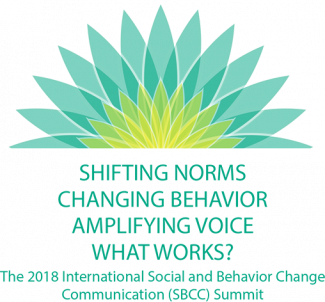Highlights from the Social and Behaviour Change Communication Summit (SBCC), Indonesia
- Author: ESubden
By Rachel Marcus
ALIGN Technical Advisor Rachel Marcus and Programme Manager Cristiana Conte attended the Social and Behaviour Change Communication Summit (SBCC) in Bali, Indonesia, from April 16-20, 2018. With more than 1000 delegates, and five packed days of sessions, Rachel Marcus writes about just some of her highlights from thematic discussions and presentations.

A thread running across many discussions was the importance of starting ‘where people are and accompanying them on a journey’. This might start with information, and introduce new ideas, but the route and the destination will depend on who is travelling. Participants in community-based processes or users of media content may ‘travel’ to places never envisaged by the programme creators.
These insights have clear implications for initiatives to transform gender norms, a key theme running throughout the summit. Many community-based life skills programmes – both those working with girls and women, and boys and men – started with activities to share valuable information, build self-confidence and leadership skills and sometimes other skills, and transition to discussion of discriminatory gender norms. A key lesson was the importance of starting from common values and participants’ aspirations, and focusing on how gender equality could help achieve these, rather than beginning with ‘attacking’ gender-discriminatory norms, which would often provoke backlash and disengagement. This was highlighted by speakers discussing both school-based programmes, such as ICRW India and community-based initiatives, including the Institute of Public Health Management, Prachod.
A fascinating session on scaling up gender-transformative approaches on the final day highlighted some of the challenges associated with transplanting programmes between contexts. In particular, participants from contexts as diverse as South Africa, Nicaragua, Tunisia and India highlighted the critical importance of allowing sufficient time for facilitators to undergo personal transformations in their own approaches to gender norms, and of not losing space for discussion and reflection in a desire to shorten timeframes and reach greater numbers.
There is a huge amount of innovation – both digital and offline – in approaches to communication for norm change. Presentations and interactive workshops explored using games (both ‘real’ and video-based), apps, and festivals to share information and promote norm change, and enabled participants to engage in interactive theatre and hone their infographic skills. Presenters emphasised the importance of creating space for dialogue, and of using multiple ‘platforms’ (e.g. community level discussion, mass media, social media) to engage users and familiarise them with new information and concepts over a long period.
Finally, the summit raised ethical issues about who is setting the agenda for desirable norm and behaviour change. It concluded with a challenge to everyone working to promote norm change to ensure the voices of marginalised people are properly heard. Far from a ‘technical fix’ through slick media campaigns or whizzy apps, social and behaviour change communication is at the heart of challenges to the status quo. (View the draft summit declaration).